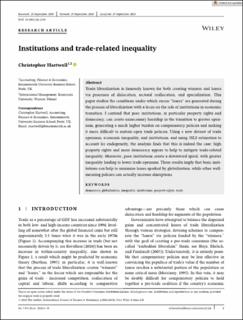Please use this identifier to cite or link to this item:
https://doi.org/10.21256/zhaw-22508Full metadata record
| DC Field | Value | Language |
|---|---|---|
| dc.contributor.author | Hartwell, Christopher | - |
| dc.date.accessioned | 2021-05-20T13:38:43Z | - |
| dc.date.available | 2021-05-20T13:38:43Z | - |
| dc.date.issued | 2020-10-20 | - |
| dc.identifier.issn | 1076-9307 | de_CH |
| dc.identifier.issn | 1099-1158 | de_CH |
| dc.identifier.uri | https://digitalcollection.zhaw.ch/handle/11475/22508 | - |
| dc.description.abstract | Trade liberalization is famously known for both creating winners and losers via processes of dislocation, sectoral reallocation, and specialization. This paper studies the conditions under which excess “losers” are generated during the process of liberalization with a focus on the role of institutions in economic transition. I contend that poor institutions, in particular property rights and democracy, can create unnecessary hardship in the transition to greater openness, generating a much higher burden on compensatory policies and making it more difficult to sustain open trade policies. Using a new dataset of trade openness, economic inequality, and institutions, and using 3SLS estimation to account for endogeneity, the analysis finds that this is indeed the case: high property rights and more democracy appear to help to mitigate trade-related inequality. Moreover, poor institutions create a downward spiral, with greater inequality leading to lower trade openness. These results imply that basic institutions can help to minimize losses sparked by globalization, while other well-meaning policies can actually increase disruptions. | de_CH |
| dc.language.iso | en | de_CH |
| dc.publisher | Wiley | de_CH |
| dc.relation.ispartof | International Journal of Finance & Economics | de_CH |
| dc.rights | http://creativecommons.org/licenses/by/4.0/ | de_CH |
| dc.subject | Democracy | de_CH |
| dc.subject | Globalization | de_CH |
| dc.subject | Inequality | de_CH |
| dc.subject | Institution | de_CH |
| dc.subject.ddc | 337: Weltwirtschaft und Handel | de_CH |
| dc.title | Institutions and trade-related inequality | de_CH |
| dc.type | Beitrag in wissenschaftlicher Zeitschrift | de_CH |
| dcterms.type | Text | de_CH |
| zhaw.departement | School of Management and Law | de_CH |
| zhaw.organisationalunit | International Management Institute (IMI) | de_CH |
| dc.identifier.doi | 10.1002/ijfe.2319 | de_CH |
| dc.identifier.doi | 10.21256/zhaw-22508 | - |
| zhaw.funding.eu | No | de_CH |
| zhaw.issue | 3 | de_CH |
| zhaw.originated.zhaw | No | de_CH |
| zhaw.pages.end | 3264 | de_CH |
| zhaw.pages.start | 3246 | de_CH |
| zhaw.publication.status | publishedVersion | de_CH |
| zhaw.volume | 27 | de_CH |
| zhaw.publication.review | Peer review (Publikation) | de_CH |
| zhaw.webfeed | W: Spitzenpublikation | de_CH |
| zhaw.author.additional | No | de_CH |
| zhaw.display.portrait | Yes | de_CH |
| Appears in collections: | Publikationen School of Management and Law | |
Files in This Item:
| File | Description | Size | Format | |
|---|---|---|---|---|
| 2020_Hartwell_Institutions-and trade-related-inequality.pdf | 1.35 MB | Adobe PDF |  View/Open |
Show simple item record
Hartwell, C. (2020). Institutions and trade-related inequality. International Journal of Finance & Economics, 27(3), 3246–3264. https://doi.org/10.1002/ijfe.2319
Hartwell, C. (2020) ‘Institutions and trade-related inequality’, International Journal of Finance & Economics, 27(3), pp. 3246–3264. Available at: https://doi.org/10.1002/ijfe.2319.
C. Hartwell, “Institutions and trade-related inequality,” International Journal of Finance & Economics, vol. 27, no. 3, pp. 3246–3264, Oct. 2020, doi: 10.1002/ijfe.2319.
HARTWELL, Christopher, 2020. Institutions and trade-related inequality. International Journal of Finance & Economics. 20 Oktober 2020. Bd. 27, Nr. 3, S. 3246–3264. DOI 10.1002/ijfe.2319
Hartwell, Christopher. 2020. “Institutions and Trade-Related Inequality.” International Journal of Finance & Economics 27 (3): 3246–64. https://doi.org/10.1002/ijfe.2319.
Hartwell, Christopher. “Institutions and Trade-Related Inequality.” International Journal of Finance & Economics, vol. 27, no. 3, Oct. 2020, pp. 3246–64, https://doi.org/10.1002/ijfe.2319.
Items in DSpace are protected by copyright, with all rights reserved, unless otherwise indicated.